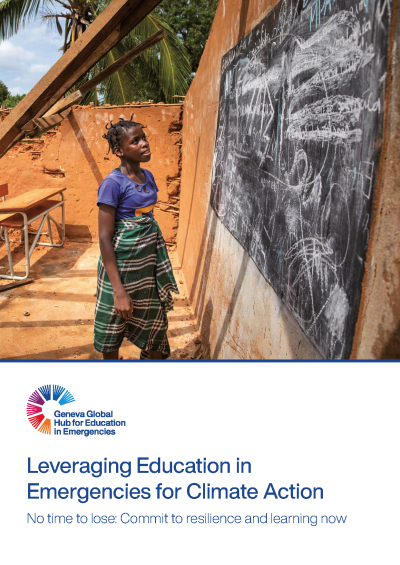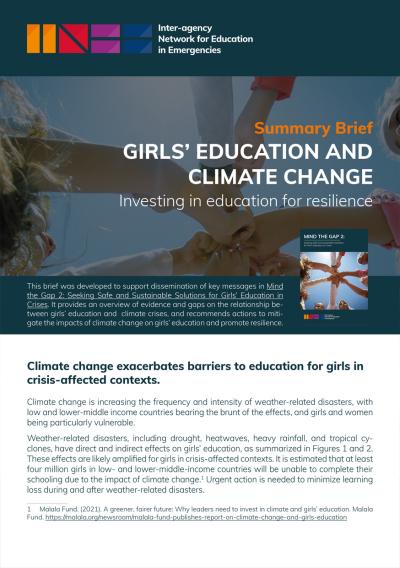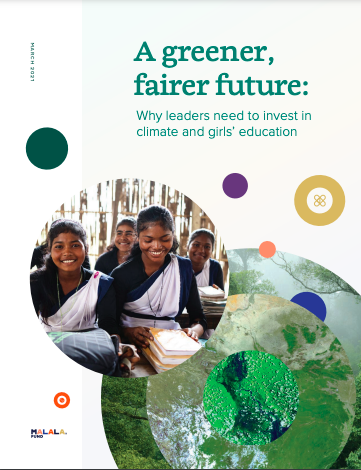أزمة المناخ
تهدد أزمة المناخ بشكل متزايد حق الأطفال والشباب في جميع أنحاء العالم في الوصول للتعليم. ويمكن للمخاطر والصدمات المرتبطة بالمناخ، مثل الجفاف وموجات الحر وحرائق الغابات والعواصف المدارية وتلوث الهواء والفيضانات، أن تبقي الأطفال والشباب بعيداً عن أسوار المدرسة وأن يكون لها تأثير كبير على التحصيل العلمي والصحة والرفاه العام لهم. وغالباً ما تضر هذه المخاطر بالبنية التحتية التعليمية أو تدمرها وتعمل على تشرد المتعلمين والمعلمين على حد سواء. قد تأثر أزمة المناخ أيضا على الجانب الاقتصادي حيث لا تستطيع الأسر على إعالة أطفالها أو دفع الرسوم المدرسية، مما يزيد من احتمالية حدوث كوارث بطيئة وتدهور بيئي. يمكن أن يؤدي ذلك إلى ترك الأطفال والشباب مقاعدهم الدراسية بشكل دائم حتى يتمكنوا من العمل لإعالة أسرهم. وكثيراً ما تكون معدلات الزواج المبكر والحمل المبكر والعنف القائم على النوع الاجتماعي مرتفعة أيضا خلال الأزمات المتصلة بالمناخ.
لقد أثرت أزمة المناخ بشكل غير متناسب على الأطفال والشباب الذين يواجهون بالفعل عدم المساواة والتمييز، بما في ذلك النساء والفتيات والأشخاص ذوي الإعاقة وأفراد مجتمعات السكان الأصليين. وفي الوقت ذاته، لا تزال القيود الناتجة عن الفقر المزمن والعنصرية المنهجية وتداعيات الاستعمار تزيد من تعرض الفئات المهمشة لهذه الأزمة. وهذا يعزز الحاجة الملحة لمعالجة تأثير تغيُّرالمناخ على التعليم، وخاصة في حالات الطوارئ.
يمكن لتخطيط التعليم المراعي لظروف النزاع أن يساهم بشكل كبير في التخفيف من آثار الصدمات المناخية على البنية التحتية التعليمية وضمان استمرارية الوصول إليها، مما يعزز من مرونة أنظمة التعليم. كما أن التعليم والتدريب المهني والتقني وتطوير المهارات يمكن أن يُعِد الشباب للمساهمة في اقتصادات مستدامة وصديقة للبيئة. يسهم التعليم في حالات الطوارئ في دعم الأطفال والشباب الأكثر عرضة للمخاطر والمتأثرين بالأزمات، من خلال تطوير مهارات تعزز قدرتهم على التكيف والصمود. علاوة على ذلك، يمكن أن يلعب التعليم في حالات الطوارئ دورًا هامًا في تمكين الأطفال والشباب ليصبحوا جزءًا من الحلول للتغير المناخي، وذلك عبر مساعدتهم على فهم تأثير أزمة المناخ والتعامل معها، وتزويدهم بالمعرفة والمهارات والقيم التي يحتاجونها ليكونوا عوامل فعالة في تحقيق التغيير الإيجابي.
تم إعداد هذه المجموعة من قِبَل سكرتارية الشبكة المشتركة لوكالات التعليم في حالات الطوارئ. لإرسال مقترحات حول الموارد أو التعديلات، يُرجى التواصل عبر البريد الإلكتروني: [email protected].







